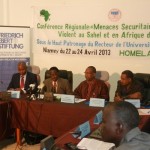A Wavering Central Sahel- Regional Responses
The "Arab Spring", which unfolded in North Africa in 2010, has triggered the successive fall of three Maghreb dictatorships, giving hope for a new deal in the devolution of power and a more sustainable democratic expression. In the wake of the regime change in Libya, it has also brought about a new strategic situation in the Sahel. The possibility to change governments has, at the same time, opened enormous avenues to citizens to take their destiny in their own hands, and ironically paved the way for some extremist Islamic groups to express their demands. The new geostrategic map is raising thorny issues about the future of democracy and security in Central Sahel and West African countries.
To foster the debate and develop policy approaches, the Friedrich-Ebert-Stiftung (FES) and WANSED (West African Network for Security and Democratic Governance) jointly organised a regional conference on the theme: ’A wavering Central Sahel- Violent Extremism in West Africa and Regional Responses’in Niamey (Niger) from 22 to 24 April 2013. The participants were comprised of experts from academia, international organisations like UNDP, UNOWA, EUCAP Sahel in Niger, the diplomatic corps, representatives from both the Nigerien Government and Parliament, civil society activists, and journalists.
The discussions highlighted weaknesses of the regional body ECOWAS, especially to effectively deploy troops in the wake of crisis. In a region, where porous borders allow extremists to move at ease from one country to another, states seem to encounter much more problems in that regard. The political position of extremist groups remained unclear. Would they be content with pursuing a “no-man’s-land” to continue their criminal activities or would they actually aim at overthrowing governments? The discussion also raised the possibility of looking for ways to highlight positive aspects, for instance how Islam might be better represented in education systems throughout the region.
The meeting also diagnosed governance and leadership failures. It was advised that ways, actors and strategies should be identifies to hold ECOWAS accountable to its decisions. The institution claims to work towards an ‘ECOWAS of the people’, yet member states have proven unable to guarantee human security when a serious crisis appeared. It was suggested that political parties at the national level, civil society organisations and national as well as regional parliaments work towards better oversight over decisions taken by the executive.
Finally, there was a strong demand from participants to work towards adressing the needs of the young: it was recommended an overview analysis be conducted on the number of youth falling prey to Islamist recruitment. In fact, the security issues would only be addressed effectively by responding to the needs of the people for social welfare.
Friedrich-Ebert-Stiftung
Peace and Security Centre of Competence Sub-Saharan Africa
Point E, Rue de Fatick x Boulevard de l'Est,
Residence Bity Lokho, 6th floor
B.P. 15 416
Dakar - Fann



